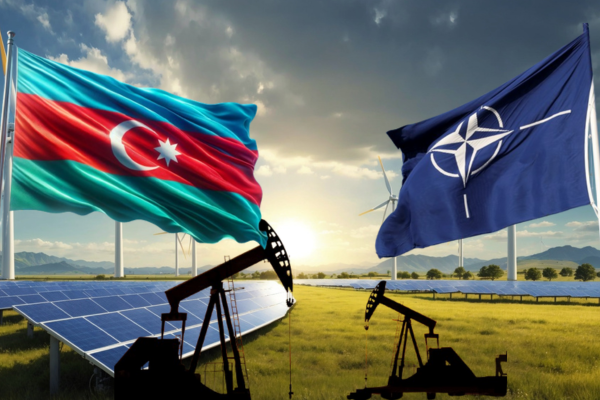From Caspian to Europe: How NATO backs Azerbaijan’s energy role

By Shams Mammadova | AzerNEWS
In today’s fragile international environment, energy security and stability have become central to both economic growth and political stability. The regions most affected are those where energy resources and transit routes intersect with geopolitical rivalries, such as the Caspian and Black Sea basins, the Middle East, and parts of Africa. Unfortunately, in our days, these areas are highly vulnerable to conflict, terrorism, and great-power competition, which in turn endangers the steady flow of oil, gas, and electricity on which modern economies depend.
It is worth recalling that three decades ago, the South Caucasus was regarded as one of the world’s most fragile regions. Yet today, thanks to Azerbaijan’s steadfast determination and skilful diplomacy, it has transformed into a hub of strategic interest and growing global engagement. It is also a great fortune that Azerbaijan, strategically located at the crossroads of Europe, Russia, Central Asia, and the Middle East, has emerged as a pivotal actor in the global energy landscape. Its vast hydrocarbon resources, coupled with modern transport infrastructure, enable the country to play an indispensable role in ensuring energy security both regionally and internationally. At a time when Europe and other parts of the world seek to reduce their dependence on traditional suppliers such as Russia, Azerbaijan has positioned itself as a credible, reliable, and forward-looking partner.
Energy lies at the heart of Azerbaijan’s foreign and security policy. The country is home to some of the Caspian Sea’s most important oil and gas fields, including Shah Deniz and Azeri–Chirag–Guneshli, which form the backbone of its hydrocarbon production. Yet Azerbaijan’s strategy goes beyond resource extraction. Its priority is to strengthen infrastructure that facilitates the delivery of oil and gas to diverse markets, particularly Europe. Projects such as the Baku–Tbilisi–Ceyhan (BTC) oil pipeline, the Baku–Tbilisi–Erzurum (BTE) gas pipeline, and the flagship Southern Gas Corridor demonstrate Azerbaijan’s determination to act as a guarantor of diversified and secure energy supplies. These projects not only serve Azerbaijan’s own interests but also contribute significantly to European energy stability.
The geopolitical environment amplifies Azerbaijan’s importance. In the Caspian and Black Sea regions, Russia’s military presence and the broader uncertainty of global security have placed energy flows at the centre of international concern. For this reason, Azerbaijan has deepened its engagement with NATO, despite not being a full member of the Alliance. Through the “Partnership for Peace” programme, joint exercises, and regular security consultations, Azerbaijan has built strong ties with NATO in areas such as infrastructure protection and intelligence cooperation. NATO, in turn, regards Azerbaijan as a strategic partner for safeguarding vital energy corridors and ensuring the uninterrupted operation of pipelines that are essential for European markets.
Equally critical are Azerbaijan’s ties with the European Union, the United States, and Türkiye. For Brussels, Baku represents a cornerstone in its energy diversification strategy. The Southern Gas Corridor, which connects Azerbaijan with Türkiye, Greece, and beyond, integrates Azerbaijani gas into Europe’s energy system, reducing reliance on Russian supplies and enhancing the EU’s energy sovereignty. For Washington, Azerbaijan is both a strategic ally in counterbalancing Russian influence and a partner in building a stable, rules-based energy order. American support—financial, technical, and political—has underpinned Azerbaijan’s ability to realise large-scale projects that transform regional energy dynamics.
Türkiye’s role is equally central. As a trusted ally and cultural partner, Ankara serves as the essential bridge linking Azerbaijani hydrocarbons to European markets. The Trans-Anatolian Natural Gas Pipeline (TANAP), a crucial component of the Southern Gas Corridor, epitomises this partnership. By facilitating the efficient and secure transfer of natural gas, TANAP strengthens not only Türkiye’s and Europe’s energy security but also consolidates the strategic partnership between Ankara and Baku.
Yet Azerbaijan’s long-term vision is not limited to hydrocarbons. Recognising that energy security today is closely tied to diversification, innovation, and clean technologies, Baku has opened its doors to broader forms of investment. In this context, China has emerged as a promising partner. As He Zenwei, President of the China Overseas Development Association, underlined at the International Investment Forum in Baku, Chinese companies are now shifting focus from oil and gas to non-oil sectors—transport and logistics, clean energy, and smart technologies. This aligns perfectly with Azerbaijan’s national strategy to reduce reliance on hydrocarbons while developing renewable energy, smart cities, and digital infrastructure. Such projects not only reinforce Azerbaijan’s economic resilience but also strengthen its role as a sustainable partner in global energy security.
The combination of traditional energy exports, modern infrastructure projects, NATO-backed security cooperation, EU and US support for diversification, Türkiye’s role as a transit ally, and China’s expanding non-oil investments illustrates a new phase of Azerbaijan’s foreign policy. It is one in which energy security is understood not merely as the uninterrupted flow of oil and gas, but as a comprehensive system that combines security guarantees, international partnerships, and forward-looking investment.
Ultimately, Azerbaijan has become far more than a supplier of hydrocarbons. It is a strategic actor shaping the regional and global energy architecture. By investing in its infrastructure, diversifying export routes, strengthening ties with NATO and Western partners, and attracting new Asian investment into green and digital projects, Baku is positioning itself as a long-term guarantor of stability. In a world where competition for resources is intensifying and security risks remain high, Azerbaijan’s role as a reliable and strategic partner will only continue to grow.
Here we are to serve you with news right now. It does not cost much, but worth your attention.
Choose to support open, independent, quality journalism and subscribe on a monthly basis.
By subscribing to our online newspaper, you can have full digital access to all news, analysis, and much more.
You can also follow AzerNEWS on Twitter @AzerNewsAz or Facebook @AzerNewsNewspaper
Thank you!
